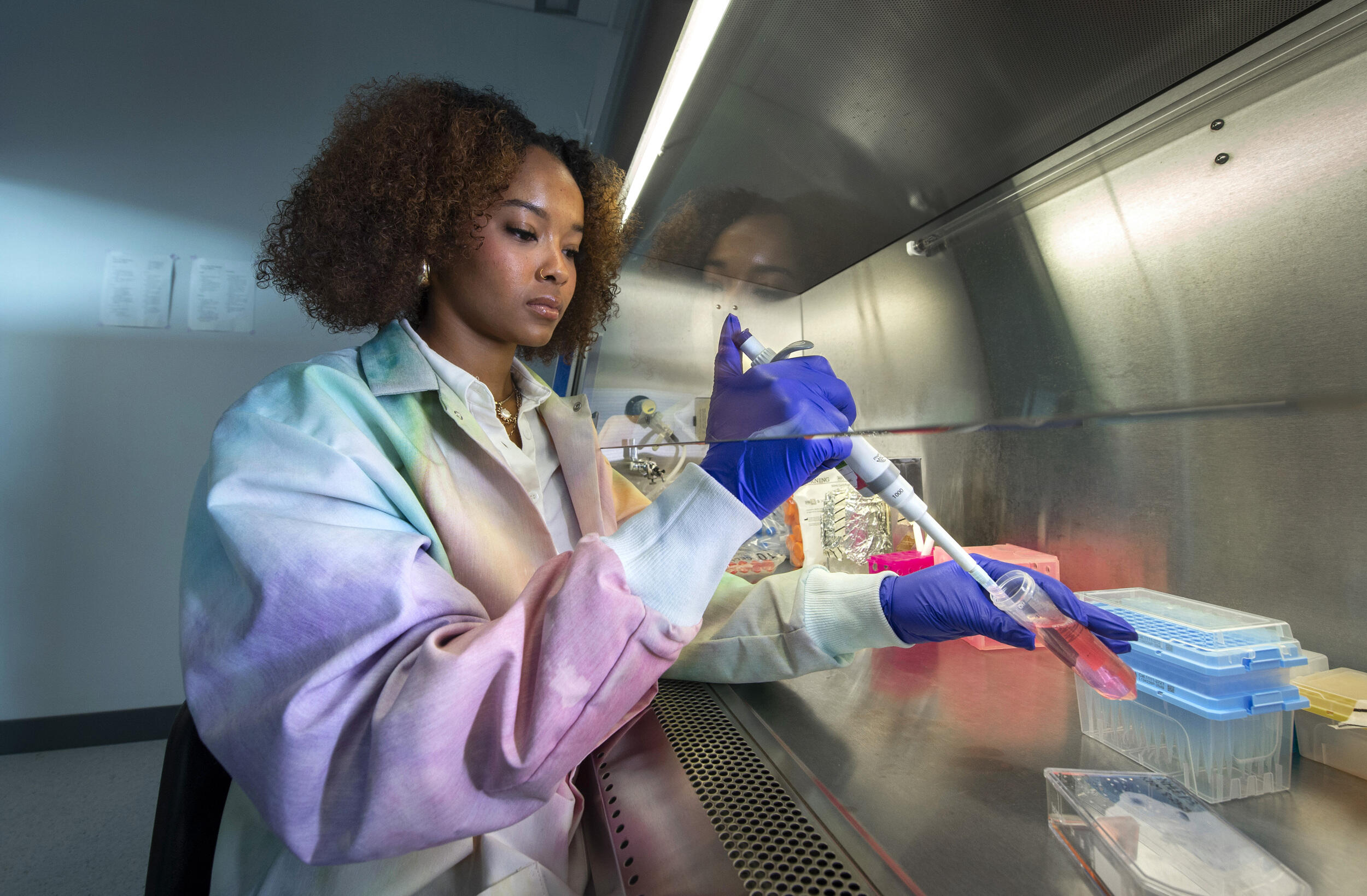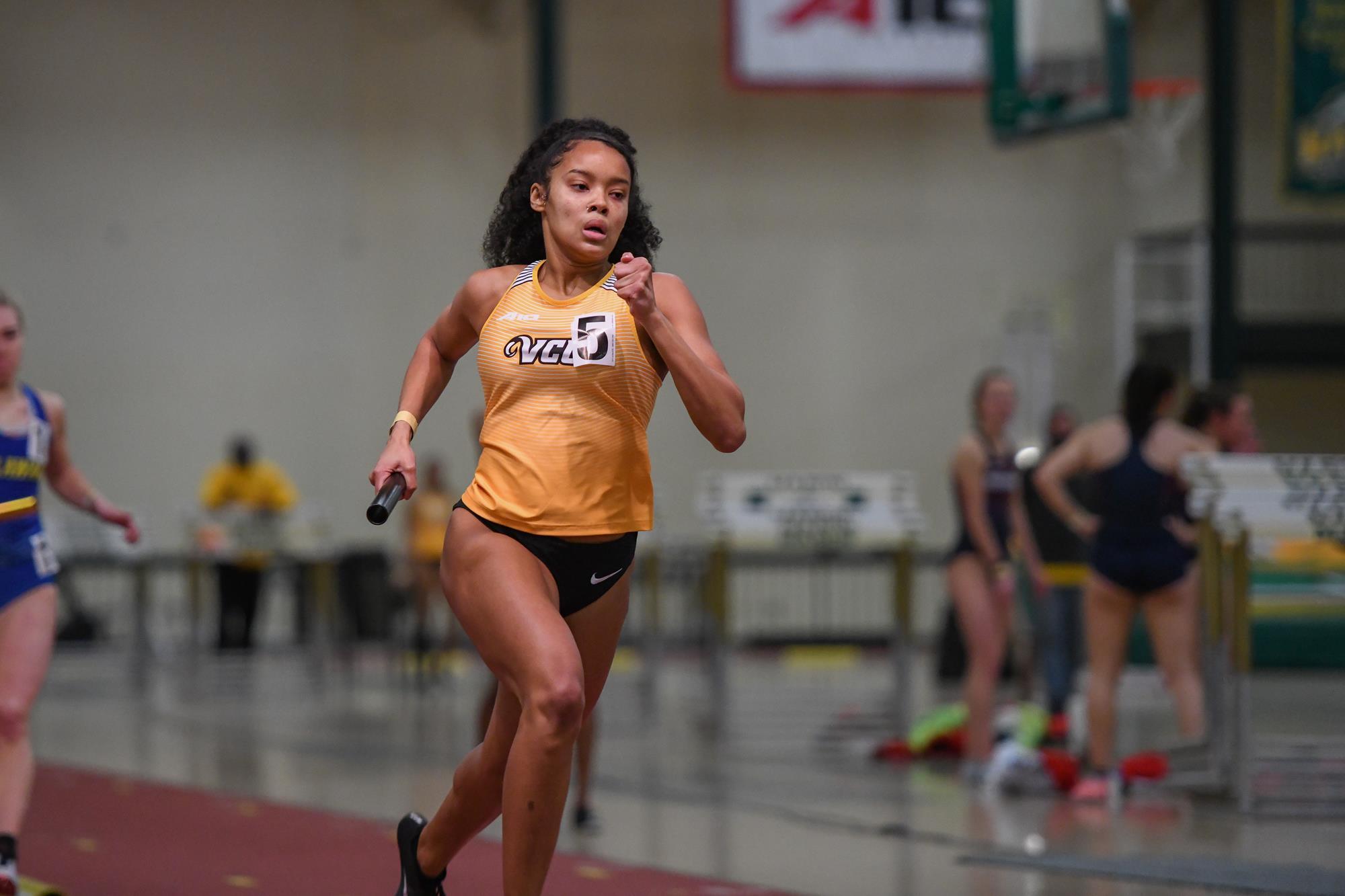
April 10, 2024
Class of 2024: Standout runner Karah Moore remains on pace for more academic excellence
The biomedical engineering major and track and field athlete embraced undergraduate research, and the next leg of a Ph.D. journey might be a stop in Spain.
Share this story
As a student-athlete on a track and field scholarship, Karah Moore never had the chance as an undergraduate to study abroad, something she always wanted to do. But as she graduates from Virginia Commonwealth University, the standout runner might be on the right track.
In choosing VCU, Moore said she wanted to join outstanding programs in athletics and academics, particularly in her chosen major of biomedical engineering. The latter ended up including significant undergraduate research – a VCU priority – and it has shaped her college experience in unexpected ways.
“I’ve been getting paid to do undergrad research, which is really rare, but I haven’t had the need to go out and get an internship or a job because I get paid to work here,” Moore said. “I was surprised by how many programs there were for women and Black people in STEM, separately and together.”
In Hawaii this past December, at an international biomaterials conference, Moore met a professor from Columbia University. In addition to discussing the potential of earning her Ph.D. there, he put her in contact with a director of a biomaterials research facility in Spain – and the prospect of a gap year doing research overseas would be a dream come true.

“I briefly mentioned my interest in working there” – the Institute for Bioengineering of Catalonia – “and he just so happened to have a connection there,” Moore said. “Nothing is finalized yet, but I am currently in discussion with a lab there about the possibility of doing a year of post-bac research.”
If the Spain opportunity develops and doesn’t change her priorities, Moore envisions ultimately pursuing a doctorate in the U.S., with a focus on biomaterials, and then working in industry. She said she has always been interested in the human body but didn’t necessarily want to be a doctor.
“The more I read about BME, the more I realized that we are unlimited in our field and there are so many different avenues we can take with the information we learn in pursuing this degree,” Moore said. “My job searches have ranged from positions at NASA to pharmaceutical companies to artificial organ generation – and that doesn’t even begin to show the expansive set of career fields I could enter.”
While VCU fit the bill for her athletic and academic passions, Moore didn’t think she would remain a Ram for four years.
“In all honesty, during my freshman year, I’d planned to transfer to a different school,” the Baltimore native said. “I never saw myself going to school in the city. I’d always pictured myself going to a classic campus. On top of that, being here in the fall of 2020, I couldn’t really meet people because the campus was empty” as the COVID-19 pandemic took hold.
But in the summer after her freshman year, Moore joined what is now called the MARC program – Maximizing Access to Research Careers. It placed her with Rebecca Heise, Ph.D., an associate professor in the VCU College of Engineering’s Department of Biomedical Engineering, and she began working in the pulmonary mechanobiology lab in the Center on Health Disparities.
“Once I joined my research group, I decided that I didn’t need to transfer because there was as much opportunity here as anywhere else,” Moore said. “I’ve been working in Dr. Heise’s lab for almost three years now, and outside of being a great mentor, she’s allowed me to take advantage of so many opportunities as far as sending me to research conferences … and encouraging me to be creative and explore my ideas.”
The MARC program provided Moore with a stipend for research and funding to attend conferences, including the recent Hawaii gathering that may open the door to Spain. To date, she has presented at five conferences, including the Annual Biomedical Research for Minoritized Scientists Conference and the Biomedical Engineering Society conference.
As Moore looks ahead, she notes how Richmond has become such a meaningful part of her emerging journey. That includes on campus – she is president of the student organization Black Women in STEM and is a member of Alpha Kappa Alpha Sorority Inc – and off. She cites her favorite garden (Sankofa Community Orchard), yoga classes in local parks and, notably, her ties to Carver Elementary School, where she has supported a STEM program and a girls mentoring program.
“VCU allowed me to find a community in Richmond,” Moore said. “I’ve loved my time here at VCU.”
Subscribe to VCU News
Subscribe to VCU News at newsletter.vcu.edu and receive a selection of stories, videos, photos, news clips and event listings in your inbox.













